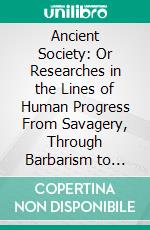Lewis H Morgan eBooks
eBooks di Lewis H Morgan
Ancient Society: Or Researches in the Lines of Human Progress From Savagery, Through Barbarism to Civilization. E-book. Formato PDF Lewis H. Morgan - Forgotten Books, 2017 -
Ancient Society, or Researches in the Lines of Human Progress from Savagery, Through Barbarism to Civilization is a significant contribution to studies of cultural anthropology. Its author, Lewis Henry Morgan, was an American statesman, anthropologist and critic of materialism. Ancient Society develops Morgan's theory of the three stages of human progress, which he theorizes progressed from Savagery through Barbarism to Civilization. Morgan's goal was to trace the advance of human development from different branches of the human family. He uses Greek, Roman and Native American family structure to explain the evolution of family. Morgan conceived of human development as units called ethna, which are similar to inventions, discoveries and domestic institutions. In his book, he traces ethna beginning at subsistence living, then to establishment of government, development of language, and the various forms of family. The final ethna are religion, house and architecture, and property. Morgan was a critic of the Three-Stage theories of history, and the book discusses why he believed that classifying different eras into bronze, stone, etc. was inadequate as a measure of human progress.Morgan was America's most influential social critic. His work was cited by Karl Marx, Friedrich Engels, Charles Darwin, and Sigmund Freud. Ancient Society, or Researches in the Lines of Human Progress from Savagery, Through Barbarism to Civilization is a compelling book for intellectual readers and those interested in a new way of looking at human development.
The American Beaver and His Works. E-book. Formato PDF Lewis H. Morgan - Forgotten Books, 2017 -
This system of classification is founded exclusively upon the anatomical structure of animals, whence comparative anatomy is the source of its materials. It not only rejects the habits and properties of animals as immaterial and transient, but it also leaves out of consideration their mental endowments, which, how ever important in other respects, were incapable of affording a basis of classification. Under its clear and definite discriminations all the species of each of the four great branches of the animal kingdom are seen in intelligible and harmonious relations, notwithstanding their striking diversities of form. Unity of type runs through the structural organization of all the individuals comprised in each Of these branches. The grandeur of this fourfold plan of creation is not more impressive than the wonderful adaptation of the sur rounding elements to the condition and wants of the multitude of animal organisms which God has made.

